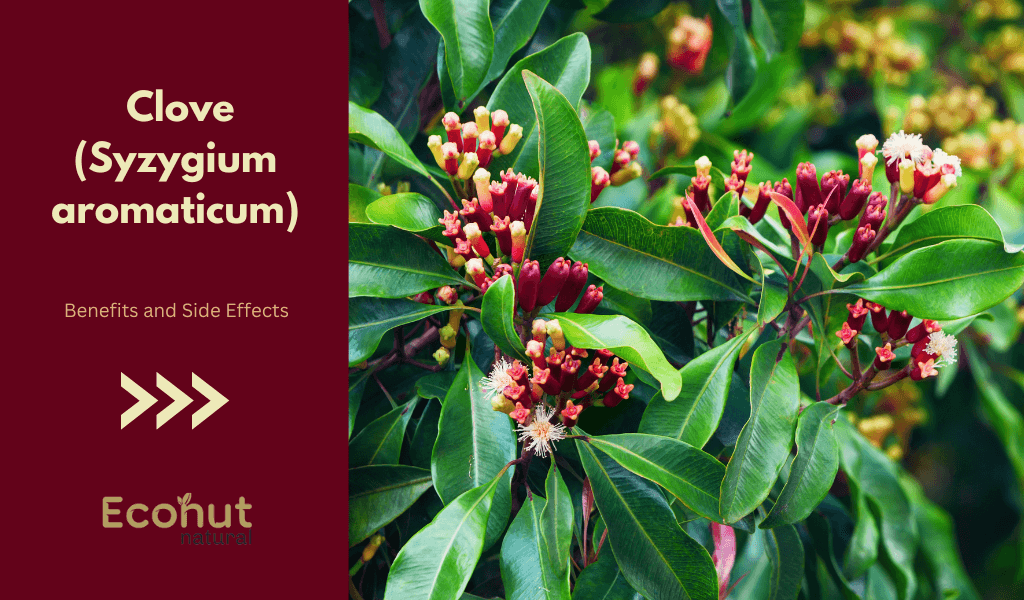Lavanga, Clove, scientifically known as Syzygium aromaticum, is an aromatic spice that comes from the dried flower buds of the clove tree. It’s a common ingredient in many cuisines around the world, known for its strong, warm, and aromatic flavor. Lavanga, Clove (Syzygium aromaticum) is one of the most valuable spices that has been used for centuries as food preservative and for many medicinal purposes.
This plant contain richest source of phenolic compounds such as eugenol, eugenol acetate and gallic acid and posses great potential for pharmaceutical, cosmetic, food and agricultural applications.
Lavanga are a versatile spice that adds flavor while also providing health benefits. They are high in antioxidants, may help regulate blood sugar, kill bacteria, and more.
Description:
Cloves are the aromatic flower buds of a tree in the family Myrtaceae, Syzygium aromaticum. They are native to the Maluku Islands, or Moluccas, in Indonesia. We discuss some characteristics of this plant are below.
Tree:
The clove tree (Syzygium aromaticum) is an evergreen tree that can grow up to 8-12 meters (26-39 feet) tall.
Leaves:
The leaves of the clove tree are glossy, dark green, and elliptical in shape. They are about 8-15 centimeters (3-6 inches) long.
Flowers:
The clove tree produces small, creamy-white flowers with a strong, aromatic scent. These flowers are quite aromatic even before they are dried.
Buds:
The flower buds are the most well-known part of the clove tree. They are unopened flower buds that turn from green to a deep reddish-brown color when dried.
Scientific Classification
| Kingdom | Plantae |
| Order | Myrtales |
| Family | Myrtaceae |
| Genus | Syzygium |
| Species | Aromaticum |
| Class | Equisetopsida |
| Subclass | Magnoliidae |
| Superorder | Rosanae |
Ayurvedic Properties
Hindi / Sanskrit
- Rasa, Tikta, Katu
- Guna, Laghu, Snigdha
- Virya, Sheeta
- Vipaka, Katu
English
- Taste, Bitter, Pungent
- Physical Property, Light, Oily
- Potency, Cold
- Metabolic Property (After Digestion), Pungent
Other Language Names
Telugu name: Lavangamu, Karavallu
Gujarathi, Kannada name: Lavanga
Latin Name: Syzygium Aromaticum
Hindi name: Laung, Lavang
Sanskrit names: Devakusuma, Bhringanga, Shekhara, Shri Prasuna, Chandanapushpaka and Varija
Tamil name: Kirambu
Malayalam name: Grampoo
Benefits of Lavanga, Clove (Syzygium aromaticum)
Cloves, those small, aromatic flower buds from the clove tree, have been used for centuries not only for their flavor in cooking but also for their potential health benefits. Here, We discuss some of health benefits regarding Lavanga, Clove (Syzygium aromaticum).
Rich Antioxidants:
Cloves are rich in antioxidants, which help to fight oxidative stress in the body. Antioxidants are important for reducing the risk of chronic diseases and inflammation.
Blood Sugar Control:
Some studies suggest that cloves may help regulate blood sugar levels, which is beneficial for people with diabetes. More research is needed in this area, but early findings are promising.
Bone health
Eugenol, the active compound in cloves, is also a natural anesthetic. This makes cloves useful for numbing pain, whether it’s toothache, headache, or muscle pain. Clove oil is sometimes used topically for this purpose.
Resolve Digestive Problems:
Cloves may aid in digestion. They are known to stimulate the production of digestive enzymes, which can help improve digestion and reduce gas and bloating.
Cholesterol Management:
There is some evidence to suggest that cloves may help improve cholesterol levels, particularly by reducing LDL (“bad”) cholesterol while increasing HDL (“good”) cholesterol.
Useful In Skin Health:
Clove oil is sometimes used in skin care products due to its antibacterial and antifungal properties. It can be helpful in treating acne and skin infections.
Contain Important Nutrient Content:
Cloves are a good source of several essential nutrients, including manganese, vitamin K, and vitamin C.
May help protect against cancer:
Some medical studies suggest that the clove oil might help protect against cancer. Eugenol shownTrusted Source to have anticancer properties. Specifically, test-tube researchTrusted Source suggests eugenol promotes cell death in breast cancer cells.
Also More: Karanj (Indian Beech)
Lavanga, Clove (Syzygium aromaticum) Side Effects
While cloves (Syzygium aromaticum) are generally safe when used in small amounts as a spice or for short-term medicinal purposes, there are some potential side effects and considerations to be aware of, especially with excessive or prolonged use.
Gastrointestinal Issues:
Consuming large amounts of cloves may lead to gastrointestinal discomfort, including stomach upset, diarrhea, or nausea.
Produces Allergic Reactions:
Some peoples may be allergic to cloves, leading to symptoms such as skin rash, itching, or swelling.
Produces Skin Irritation:
Direct contact with undiluted clove oil can cause skin irritation and even burns. Always dilute essential oils before applying to the skin.
Blood and Sugar Related Effects:
Cloves may affect blood sugar levels, so individuals with diabetes should monitor their levels closely if consuming large amounts.
Avoid During Pregnancy and Breastfeeding:
Pregnant and breastfeeding women should avoid consuming large amounts of cloves due to limited safety data.
Medicine Interactions:
Cloves may have anticoagulant effects, so caution is advised when taking them with blood-thinning medications like Warfarin. This herb may lower blood sugar levels, so combining them with diabetes medications could lead to hypoglycemia.
Effect On Liver Health:
Excessive use of cloves may affect liver function, especially in peoples with existing liver conditions or those taking medications that affect the liver.
High Dosage may be Toxic:
Clove oil, when ingested in large quantities, can be toxic. It’s important to use it in moderation and avoid swallowing large amounts.
Conclusion
Cloves are more than just a spice—they’re a powerhouse of flavor and health benefits. From their rich history in ancient trade routes to their use in culinary creations worldwide, cloves have left an indelible mark on cultures and cuisines. Packed with antioxidants and antimicrobial properties, they offer potential health perks, from aiding digestion to promoting oral health.
FAQS
Can cloves be used for skin care?
Applying a small amount of clove oil directly to the affected tooth or gums can help numb the area and reduce pain. It’s important to dilute the oil with a carrier oil to avoid irritation. Adding a few drops of clove oil to warm water to use as a mouthwash can also help soothe toothache.
Can cloves be used for skin care?
Yes, Clove oil has antibacterial properties that may be beneficial for acne treatment. It should be diluted before applying to the skin.
Can cloves be used for weight loss?
Some Medical report suggest that compounds in cloves may help boost metabolism. However, they are not a magic solution for weight loss and should be part of a balanced diet and exercise routine.
Can Cloves Help with Coughs and Sore Throats?
Yes, the soothing properties of cloves can help with coughs and sore throats. Clove tea or simply sucking on a clove can provide relief.

